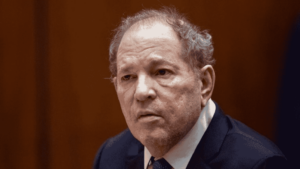The legal saga unfolding amid the #MeToo movement witnessed a significant development as the New York Court of Appeals overturned the rape conviction of prominent Hollywood figure Harvey Weinstein, which was issued in 2020.
According to The Hollywood Reporter, the ruling, decided by a close 4-3 margin, cited biased conduct by the trial judge and called for a new trial for the disgraced producer.
Renowned for his contributions to acclaimed films such as “Shakespeare in Love” and “Good Will Hunting,” Weinstein is currently serving a 23-year sentence at the Mohawk Correctional Facility in Oneida County, New York.
In 2022, Weinstein was convicted of another rape in Los Angeles, leading to an extension of his sentence by 16 years. Despite the recent overturning of his New York conviction, he remains incarcerated. It’s worth mentioning that Weinstein was acquitted of all charges in the Los Angeles trial involving a witness from the New York case.
Weinstein’s spokesperson, Juda Engelmayer, reacted to the ruling with tempered optimism, acknowledging the ongoing legal challenges that still need to be addressed.
He stated, “We are cautiously excited. He still has a long road ahead of him because of the Los Angeles case. We are studying the ramifications of the appeal right now.”
According to The Hollywood Reporter, Judge Jenny Rivera’s majority decision emphasized the importance of fair legal proceedings and criticized the inclusion of uncharged accusations as a form of prejudiced conduct.
The defense team representing Weinstein echoed this sentiment, asserting that the testimony unjustly tarnished his reputation without directly addressing the specific allegations.
Douglas Wigdor, representing pre-trial witnesses, expressed disappointment with the court’s ruling, underscoring its harmful impact on sexual assault survivors. Conversely, Judge Madeline Singas, who opposed the decision, stressed the significance of supporting survivors and criticized the ruling for hindering efforts to address the intricacies of sexual assault cases.
The Manhattan District Attorney’s Office vowed to pursue a retrial of the case following the appellate decision, reaffirming its dedication to seeking justice for sexual assault victims. Arthur Aidala, leader of Weinstein’s defense team, will address the media on Friday to discuss the implications of the ruling and outline their future strategy.
The Weinstein trial controversy underscores wider legal debates regarding the admission of testimony regarding past misconduct, a topic that resonates in prominent cases such as Bill Cosby’s.














